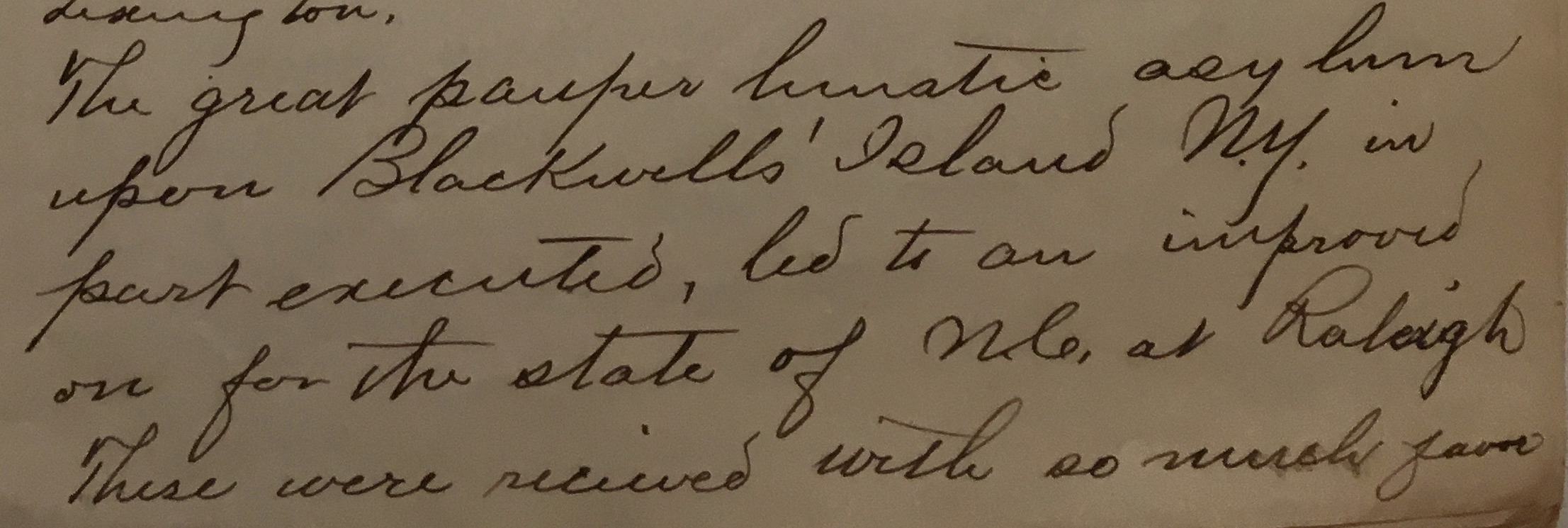We have integrated the asylum initiative into project-based graduate education and professional training at UNC through interdisciplinary graduate research seminars, offered every semester since 2018. The seminar has been taken by graduate and professional students from Nursing, Medicine, Public Health, Health Humanities, Folklore, Geography, American Studies, Literature, and History. They have been organized around case study projects that link archival records with digitized family history sources and digitized local newspapers to create biographical narratives.
A nurse’s note stuffed between pages in the admissions ledger led us to a case that challenged and complicated turn-of-the-century theories of the demography of suicide. An initial puzzlement over the frequency of the terrible disease pellagra as both a “supposed cause” for admission and as a cause of patient death prompted us to look at the relationships among nutrition, public health, and “madness” through the twenty-year epidemic of this horrible disease in the South, eventually discovered to be caused by an easily remedied vitamin deficiency.
Case studies from spring term 2021 focused on, among other topics, the medicalization of grief, physicians as patients in the asylum, Lebanese migration to North Carolina, and the state “training school” for wayward girls (Samarcand in Moore County, NC).
One case pointed to the Dix’s role in the nascent eugenics movement in North Carolina in the early 1920s through a detailed examination of what was called a “notorious family” in Wake County and the public health official who argued they should have been prevented from having children.
At the beginning of the spring term of 2020, the seminar participants were eager to explore the relationship between race and the asylum—at Dix and in the development of modern psychiatry. Read more about our work on race and indigenity here.
Practicum
The Fall Term 2021 and Spring Term 2022 offerings of the CHW-linked graduate research experience are practicum-based. They aim to match the skills and experience of graduate and professional students from diverse disciplinary backgrounds and professional tracks with ongoing and emerging projects.
Priorities include:
- Expanding research on the creation of race through theorization, institutional inclusion/exclusion (of Black, Indigenous, and People of Color), and professional practice at Dix and Cherry Hospitals
- Field-testing of our new relational database for data management, digital mapping, and data visualization
- Post-COVID updating of admissions ledgers, patient interviews, and medical staff meeting minutes (1918-1921) from the State Archives of North Carolina (digitization, transcription, metadata)
- Identification of complementary “transinstitutional” state records (other state hospitals, training schools, detention centers, orphanages, etc.)
- Engaging scholars around the digitized and transcribed papers of Anna Cameron Kirkland, the asylum’s first female patient
- Developing models of qualitative and quantitative analysis of admission records for 600 individuals diagnosed with dementia praecox or manic depression (in collaboration with Dr. Rose Mary Xavier’s “X Lab” in the UNC School of Nursing)
- Research and creation of “microhistory” blog posts
We are confident that the generative nature of all our work will stimulate other opportunities for interdisciplinary, collaborative scholarship and professional practice.

